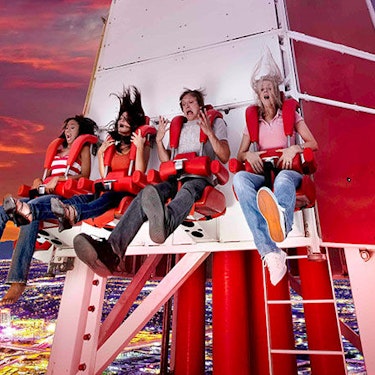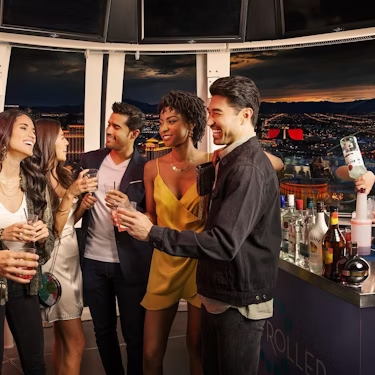More about: Horseback Riding in Las Vegas
Las Vegas is much more than casinos, big hotels and shows. A few kilometres from the metropolis lies a huge desert teeming with life. In the past, this was the territory of cowboys, miners and bandits, while today it is the realm of numerous animal species.
In my opinion, a horseback ride is one of the best attractions in Las Vegas. You'll be immersed in nature and finish the ride with a hearty breakfast or barbecue dinner that will make you feel like a true pioneer.
1. Sunset horseback riding with dinner
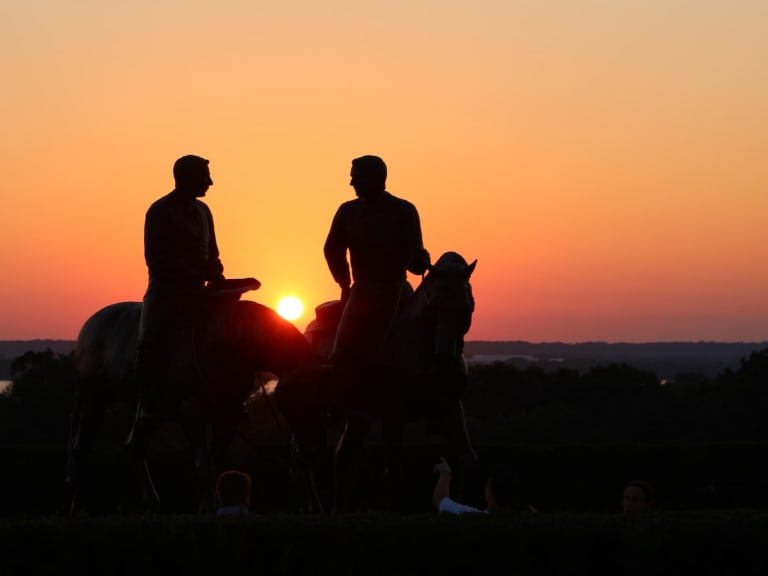
How would you like to ride through the canyons and prairies of Nevada at sunset? Have you always dreamed of dining by the fire as the sun leaves the far west? This tour is the answer to your wishes.
A car will pick you up on the famous Las Vegas Strip and take you out into the desert. Normally you will be able to choose between two time slots: between 14:00 and 15:00 (in winter) or between 16:00 and 17:00 (in summer).
Before returning to your hotel, you'll enjoy a cowboy-style barbecue with juicy barbecued meat, the perfect way to end the day. Vegan options are also available.
- Duration: about 5 hours
- Price: between 150 € and 200 €.
2. Horseback riding along the Outlaw Trail

The Nevada desert was once traversed by the Outlaw Trail, an inaccessible route that was used by adventurers and bandits of all kinds. Without the worry of ambush, the walk is much more enjoyable. You'll see prairies, wild burros and typical Wild West landmarks.
A vehicle will pick you up at your hotel and escort you to the ranch in the Moapa Valley. Once there, the guide will explain the rules of the tour and give you some useful tips about the horses. Don't worry, they are very docile and are used to the presence of tourists.
The tour takes place in the morning - you will be picked up around 7:00 - and ends with a well-deserved breakfast with pancakes, sausages, eggs, hash browns, toast, coffee and orange juice. Vegan options are also available.
- Duration: about 5 hours
- Price: about 120 €.
When is the best time to go horseback riding in Las Vegas?

Spring and autumn are the best seasons for horseback riding in the desert. More specifically, the best time is in May, June and September when the sun is a little less intense than usual.
Las Vegas is located in the middle of the Nevada desert and therefore has its own unique climate. If you are planning a summer holiday, you should know that highs can easily reach 40 degrees Celsius.
In any case, if you visit Las Vegas in winter you will have to deal with inclement weather, especially at night, when temperatures can reach negative. During the day, the high is around 10 degrees Celsius. You will need to bring a jacket and/or a wool jumper.
Can I ride a horse if I have never ridden before?
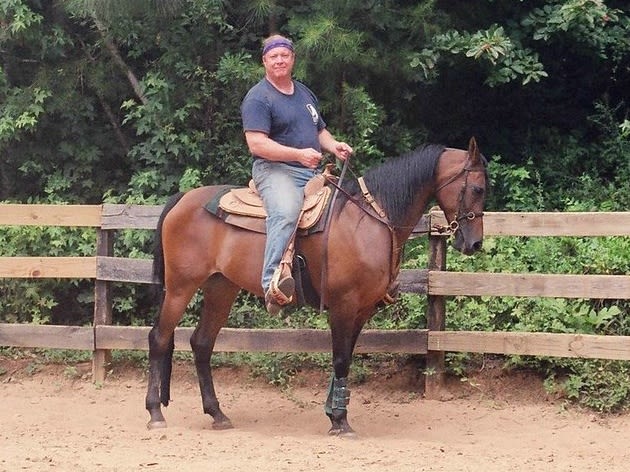
Yes, these excursions are designed for a wide public and therefore use docile and tame horses. In any case, it is important to bear in mind a few elements:
- It is important to establish an empathetic bond. In general, it is advisable to let the horse get close to you and this may take some time
- For horses, the nose is an important and delicate point, so you should avoid stroking them there. You can only do this if the four-footed horse knows you well
- Do not approach them from the front, they may interpret your presence as a danger
- Avoid sudden movements
- Do not shout, if you use a calm tone of voice you will have no problems
- If you do not know the horse well, do not stand at the back
- Horses can be frightened by sudden noises, always bear this in mind. Fortunately, in the desert this is not very common
Don't worry, the guides are experienced and will give you all the information (and help) you need.
How does the horseback riding route work?

In order to guarantee a safe and efficient route, the ride takes place in single file. Even if you know how to ride a horse perfectly well, you will not be allowed to gallop or run.
If it's adrenaline you're after, I recommend another activity: an off-road vehicle tour in Las Vegas. You will drive an ATV in the Mojave Desert.
Is this activity suitable for children?

It depends on age. The most common is that these excursions do not admit participants under 6 or 7 years of age. Before booking the tour, I advise you to read the details carefully. In any case, there is no shortage of attractions dedicated to the youngest members of the family:
- Shark Reef Aquarium, the aquarium of the Mandalay Bay hotel. The special feature of this environment are the tunnels that go through the water tanks and allow you to see sharks, turtles and hundreds of colourful fish at close range. I recommend buying tickets to the Shark Reef Aquarium in Las Vegas in advance (3950 S Las Vegas Boulevard)
- M&M's World, the giant chocolate shop housed in the Showcase Mall. You can personalise your M&M's with a special printer (3785 South Las Vegas Boulevard)
- Madame Tussauds, the famous wax museum. Its special feature is the Marvel Universe 4D, a film with breathtaking special effects. The cheapest ticket costs about 35 € (3377 S. Las Vegas Boulevard, Suite 2001)
This list lists just a few of the many attractions. For more ideas, I recommend reading the post listing 10 things to do in Las Vegas with kids. You'll discover that Sin City is not just a destination for adults...
How should I dress for horseback riding?

You don't need to wear (or buy) any specific clothing for the horseback rides. The helmet will be provided by the agency and, for the rest, you only have to take a few precautions:
- It is an outdoor activity and, in these cases, the watchword is comfort. Wear appropriate clothing as you will be spending several hours in the wilderness.
- Although the desert around Las Vegas is hot, the temperature range is very wide. To avoid getting too hot (or too cold), dress in layers!
- Avoid shorts and skirts. The constant rubbing of bare skin against the saddle and the horse's body can turn your ride into a nightmare. Jeans will prevent chafing and rashes
- Always wear closed shoes and don't wear necklaces, earrings or anything else that can get caught in trees and bushes
- Don't forget sunglasses and sun cream to protect exposed skin.
What happens if the route is cancelled due to bad weather?
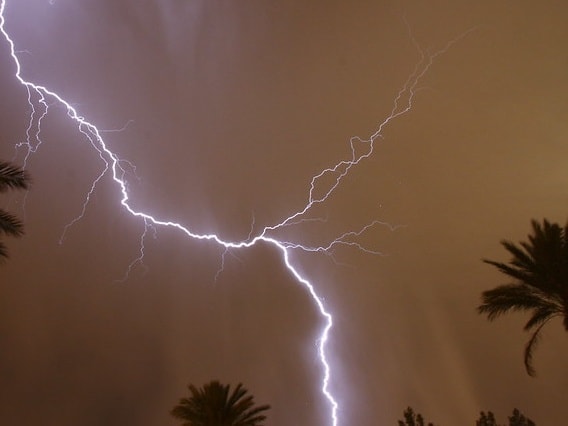
There are usually two options for any excursion of this type: a full refund or a change of date.
In either case, there is little or no rain in the Nevada desert and it is very unlikely that the tour will be cancelled due to a storm. In the rare event of rain, you can try your luck at a casino or visit the following attractions:
- The Mob Museum, which traces the history of organised crime in Las Vegas and the state's efforts to combat it. There's also a bar that recreates the speakeasies of Prohibition - the reviews are excellent! (300 Stewart Avenue)
- Try the best restaurants in town. In Sin City you can opt for Wing Lei (famous for Imperial Peking duck and Maine lobster wok), Estiatorio Milos (specialising in Greek recipes and Mediterranean flavours) or Mizumi (a very refined Japanese), among others
- Visit the Titanic exhibit in Las Vegas. You will see more than 200 elements recovered from the famous ocean liner, such as the monumental staircase that welcomed passengers
- Defy gravity. Put on a special suit and fly in a wind tunnel. Companies such as Vegas Indoor Diving organise this type of experience
- Relax with a good massage. I recommend you read the article that lists the best spas in Las Vegas.
What can you see on this type of excursion?
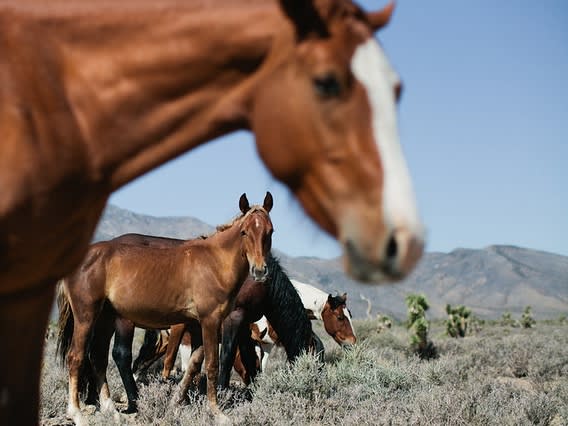
The Wild West is an extreme territory and home to many species, both animal and plant. Read on to find out what you'll see on your horseback ride.
Wildlife
Nevada's Desert National Wildlife Refuge is located a few kilometres north of Las Vegas. It was established in 1936 to protect the wildlife that lives in this area. On a horseback ride you may encounter the following animals:
- Wild burros were brought to Nevada in the 16th century to be used as work animals. Because of their strength and carrying capacity, they played a crucial role in the westward expansion of the United States. They are very intelligent animals and have a coat of different colours, they can be grey, almost white, black or brown
- Roadrunner, a large, slender bird with a very long tail. It spends most of its time on the ground and when it runs, it can exceed 30 km/h
- Coyote, the opportunistic predator of the desert. It feeds on practically everything: rodents, lizards, small snakes, hares, birds, but also carrion, insects and some plants. It can be seen mainly at dusk and at night. You are more likely to see it if you choose the first excursion. If you are fascinated by this animal, I also recommend another activity: a trip to Zion Wilderness Park from Las Vegas
- Desert Bighorn sheep, recognisable by their distinctive curved horns. When you're on the horse, look out for the rugged terrain and steep slopes that are its natural habitat. It withstands the most extreme temperatures and can go for long periods without drinking
- Mojave Desert Tortoise, a species that survives the most extreme temperatures by staying underground for long periods of time. If you see it, don't hold it in your hand! When it feels threatened, the tortoise empties its bladder. In such hostile territory, this loss of fluid could be fatal
- Jackrabbit, the black-tailed jackrabbit. It is recognised by its large ears, which have a dual function: to detect approaching predators and to disperse heat
- Athene cunicularia, one of the smallest owls in North America. It has very long legs and spends most of its time on the ground, where it finds its favourite prey: insects and small mammals
- Mule Deer, larger and more robust than a traditional deer. You will recognise it by two features: the black forehead that forms a kind of mask and the large ears
- Grey fox, a solitary animal with mostly nocturnal habits. At first glance it may look like a coyote but if you look closely, you will notice that it has a bushy tail and shorter legs
- Bald eagle, the symbol of the United States. They are usually in Nevada between December and February. A pair of binoculars will allow you to admire their flights and glides.
Flora
The desert has an extreme climate: scorching during the day and plummeting temperatures at night. Despite this, the rocks and arid soils of the region are home to trees, shrubs and (above all) succulent plants:
- Teddy Bear Cholla, a stout, cylindrical cactus covered in thick golden spines. Stay away, they are easily removed and can remain in the skin
- Larrea tridentata, a shrub very common in the deserts of Nevada. It has small leaves covered with a waxy coating that prevents moisture loss. When it blooms, you will recognise it by its yellow petals
- Joshua Tree. It is actually called Yucca brevifolia but got its name from the Mormons who saw a resemblance to the hand of the biblical patriarch of the same name asking God for help. It is mostly found in the Mojave Desert
- Mesquite, halfway between a large shrub and a small tree. It belongs to the legume family and played a crucial role for both Native Americans and pioneers. Its beans fed thousands of settlers during desert crossings
- Opuntia chlorotica, a blue-green succulent with rounded leaves. The spines become darker as the years go by
This list brings together the main ones, counting succulent plants alone there are easily more than 20 species. By the way, if you like nature, I recommend a visit to the Las Vegas Museum of Natural History.
Are there any other outdoor activities worth doing?

Of course there are! The wilderness surrounding Sin City and the city of Las Vegas itself allow for a myriad of activities at any time of the year. The list below lists the main ones:
- Hiking Mount Charleston. If you have a rental car, you can reach this mountain range just a few kilometres from the city. One trail that is not particularly challenging is the Mary Jane Falls trail. It is about three kilometres long and ends with a splendid panoramic view of the surrounding canyons
- Piscinas, the perfect option to escape the heat. Most of the pools in Las Vegas allow entry even to those not staying at the hotels. Among the best are Liquid Pool (if you're in the mood to party, 3730 S Las Vegas Boulevard), The Cosmopolitan (3708 Las Vegas Boulevard South) and The Tank, best known for its pool with a real shark (separate, of course). Located at 129 Fremont Street
- Kayak tour of the Colorado River. An air-conditioned bus will pick you up at your hotel and escort you to the Black Canyon. The river rafting is a worthwhile adventure. For more information I recommend you read the post about Hoover Dam tours from Las Vegas. Some of them include this activity
- Water activities on Lake Mead. Agencies such as Boating Lake Mead rent out jet skis, paddle surfers and electric boats.
Tips for a horseback riding tour

- In most cases, helmets are only mandatory for children under 12 years of age. However, I recommend that you ask for it
- You will spend a few hours in the desert, which is a very extreme place. Although you won't be visiting during the middle of the day, take sunscreen to avoid sunburn
- Riding a horse puts a strain on the muscles of your back, pelvis, legs and arms. To avoid soreness, you can do some stretches before getting into the saddle. Turn your head clockwise and counterclockwise, bring your knee to your chest and hold your leg up for 10 seconds, spread your legs apart and touch the ground. These simple movements are very helpful
- Before starting the activity, the guide will ask you about your level of preparation. Don't lie, the guide will assign you a horse suitable for your level.




